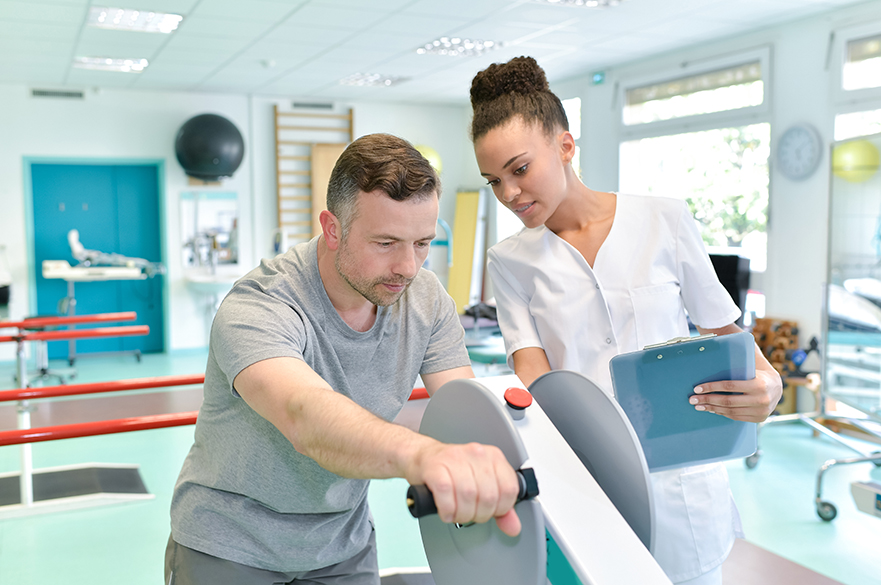Paramedic Science MSc
About this course
Today’s Paramedic is a highly skilled healthcare practitioner, who provides high quality urgent or emergency care to patients in a wide range of exciting, fast-paced and challenging environments. The Paramedic profession is at the forefront of the developing modern NHS, with paramedics extending their role in to an increasing range of new and exciting areas.
Upon successful completion of this 2-year MSc Programme, you'll be eligible to apply for registration with the Health and Care Professions Council (HCPC) as a Paramedic.
What you’ll study
Providing a full-time, two-year route to achieving the MSc Paramedic Science, this course combines all the components required for you to become a registered paramedic, and builds on your undergraduate experience. Built on a blended learning approach, with on campus tuition in university mixed with online and independent learning activities.
You’ll also spend approximately 600 hours on placement per year, predominantly with a named practice educator within the ambulance service, but also in a range of additional non-ambulance placements that will complement your experience and learning. On successful completion of the course, you’ll be eligible to apply for registration with the Health and Care Professions Council (HCPC) as a paramedic.
- Principles of Paramedic Practice (30 credits)
- Human Health and Illness (30 credits)
- Legal, Professional & Ethical Practice (30 credits)
- Advancing Paramedic Practice (30 credits)
- Transitioning to Autonomous Practice Supporting and Developing Others (30 credits)
- Dissertation (30 credits)
We regularly review and update our course content based on student and employer feedback, ensuring that all of our courses remain current and relevant. This may result in changes to module content or module availability in future years.
Don’t just take our word for it, hear from our students themselves
Q&A - MSc Paramedic Science
How you're taught
Delivery mode
As a postgraduate learner, your course is built on a blended learning approach with elements of face-to-face tuition in university, alongside online and independent learning activities. You will also spend approximately 750 hours on placement, predominantly with your practice educator within the ambulance service, but also in a range of additional placements that will compliment your experience and learning.
Placement
Practice placement is a compulsory component of the course to enable you to develop the necessary competencies required for registration and practice as a registered Paramedic. You will not be paid for this time and travel expenses are not refunded as part of the course.
You will spend most of you time on placement working with your dedicated Practice Educator who will guide and develop your skills and knowledge.
You will follow compulsory clinical shift patterns of your Practice Educator and this will include unsociable hours including days, nights, weekends and bank holidays. You will be expected to complete approximately 1,200 hours over the 2 years of the programme.
Assessment
Assessment methods on the course include but are not limited to:
- OSCE (Objective Structured Clinical Examinations) - Practical demonstrations of skills in a simulated environment
- Practice Educators observations of competency in practice
- An E-portfolio (PebblePad)
- Case studies
- Reflective accounts
- Presentations
- Academic posters
- Essays
- Multiple-choice and short-answer question exams.
- Simulated Multi-disciplinary meetings
Careers and employability
After graduating from this MSc degree in Paramedic Science, you'll be eligible to apply for registration with the Health and Care Professions Council. Because of the current high demand for registered paramedics in urgent and emergency care settings, your career prospects are excellent, both locally, nationally and internationally.
Following the completion of your Newly Qualified Paramedic (NQP) programme in addition to the traditional roles of the Ambulance paramedic there are many other roles available to you as your experience grows.
These include but are not limited to:
- Advanced Paramedic (AP)/ Specialist Paramedic (SP) Specialising in Emergency Department, Prehospital or Primary care
- Critical care paramedic (CCP)
- Hazardous area response teams (HART)
- Urban Search and Rescue (USAR)
- Helicopter / Search and rescue
- Wilderness / Remote medical support
- Telephone triage /111 call advisors
- Event medics
- Primary care paramedic (GP or Community)
- Emergent or Urgent care (Hospital)
- Mental Health Specialist
Further details are available from the College of Paramedics.
If you’d like to know more about NTU’s groundbreaking Employability Promise, and the support you’ll receive both during and after your course, visit our Careers and Employability page.
Campus and facilities
You’ll mainly be studying in the purpose-built Health & Allied Professions (HAP) Centre. The 34,000 square foot building features mock hospital wards, consultation and counselling rooms, creative teaching spaces and specialist equipment.
Our self-contained, community-focused Clifton Campus has been designed to keep our students busy between lectures. Catch-up with your coursemates in the Pavilion’s barista café and Refectory; brainstorm group presentations in chic and stylish study spaces; enjoy some proper R&R in The Point, home of our Students’ Union. The campus also hosts the multimillion-pound Clifton Sports Hub, offering great options for everyone — whatever your interests, and however competitive you’d like to get!
You’re also right next to the bright lights of Nottingham — one of Britain’s top 10 student cities, and one of Europe’s top 25. All through termtime, a dedicated on-campus bus service will get you to the heart of the action (and back) in under 25 minutes. You’ll find a city stuffed with history, culture, and well-kept secrets to discover at your leisure: enjoy lush green spaces, galleries, hidden cinemas and vintage shopping by day, and an acclaimed food, drink and social scene by night.
Take our virtual tour to get a real feel for the campus.
Entry requirements
UK students
- 3 GCSE passes at grade C or grade 4 or above including Science, English and Maths.
- an undergraduate degree (minimum 2.2) in a human science or healthcare related subject, for example: human science, nursing, midwifery or an allied health profession
- Applicants holding non-human sciences undergraduate degree, will be considered if they are able to demonstrate subject specific knowledge from another source. Applicants must be able to demonstrate a minimum of 150 hours of direct care experience. Relevant voluntary experience would be accepted as hours on a case by case basis. The direct patient contact experience must be gained prior to application
- NMC or HCPC registrants with conditions of practice are not eligible to apply for this course.
Additional requirements for UK students
- undertake an interview with a lecturer, practitioner or service user
- complete an enhanced-level Disclosure and Barring Service check
- must be of good health and good character
- you will be required to provide detailed health information to occupational health who will, after reviewing your evidence, assess your suitability for the role
- provide evidence of vaccination against Hep B, or undergo a vaccination programme, before any placements can be undertaken.
IELTS
If English is not your first language you will need an IELTS score of 6.5. Please note that the Health and Care Professions Council (HCPC) require IELTS 7.0 with no element below 6.5 for registration.
Important Information
The MSc Paramedic Science at NTU has a limited number of places available to ensure that you receive a good quality placement experience. In exceptional circumstances this may result in the course becoming full before you have completed the admissions process. In this situation we will offer you the opportunity to be considered for the following year’s entry.
Other qualifications and experience
We welcome applications from students with non-standard qualifications and learning backgrounds and work experience. We consider credit transfer, vocational and professional qualifications, and any work or life experience you may have.
You can view our Recognition of Prior Learning and Credit Transfer Policy which outlines the process and options available, such as recognising experiential learning and credit transfer.
Getting in touch
If you need more help or information, get in touch through our enquiry form.
International students
Please note: We are unable to accept applications from individuals on a Student Route/Tier 4 Student Visa.
Academic entry requirements: An undergraduate degree (minimum 2.2) in a human science or healthcare related subject, for example: human science, nursing, midwifery or an allied health profession. Please check your international qualifications on our international entry requirements page.
Applicants holding non-human sciences undergraduate degree, will be considered if they are able to demonstrate subject specific knowledge from another source. Applicants must be able to demonstrate a minimum of 150 hours of direct care experience. Relevant voluntary experience would be accepted as hours on a case by case basis. The direct patient contact experience must be gained prior to application
Other requirements: 3 GCSE passes at grade C or grade 4 or above including Science, English and Maths.
English language requirements: See our English language requirements page for requirements for your subject and information on alternative tests and Pre-sessional English.
NMC or HCPC registrants with conditions of practice are not eligible to apply for this course.
Additional requirements for international students
- undertake an interview with a lecturer, practitioner or service user
- complete an enhanced-level Disclosure and Barring Service check
- must be of good health and good character
- you will be required to provide detailed health information to occupational health who will, after reviewing your evidence, assess your suitability for the role.
- provide evidence of vaccination against Hep B, or undergo a vaccination programme, before any placements can be undertaken.
English language requirements
View our English language requirements for all courses, including alternative English language tests and country qualifications accepted by the University.
If you need help achieving the language requirements, we offer a Pre-Sessional English for Academic Purposes course on our City campus which is an intensive preparation course for academic study at NTU.
Other qualifications and experience
We welcome applications from students with non-standard qualifications and learning backgrounds and work experience. We consider credit transfer, vocational and professional qualifications, and any work or life experience you may have.
You can view our Recognition of Prior Learning and Credit Transfer Policy which outlines the process and options available, such as recognising experiential learning and credit transfer.
Sign up for emails
Sign up to receive regular emails from the International Office. You'll hear about our news, scholarships and any upcoming events in your country with our expert regional teams.
Getting in touch
If you need advice about studying at NTU as an international student or how to apply, our international webpages are a great place to start. If you have any questions about your study options, your international qualifications, experience, grades or other results, please get in touch through our enquiry form. Our international teams are highly experienced in answering queries from students all over the world.
Policies
We strive to make our admissions procedures as fair and clear as possible. To find out more about how we make offers, visit our admissions policies page.










